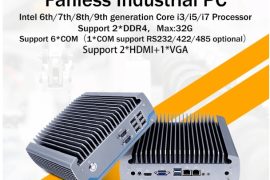Welcome to the fascinating world of fanless industrial pcs – a remarkable technology that’s revolutionizing various industries and driving substantial innovation. Imagine computers built with exceptional durability, extreme temperature resilience, and peak performance, all without the need for noisy cooling fans. These silent powerhouses are called fanless industrial PCs, and in this blog post, we will unveil their secrets, explore their incredible capabilities, and delve into how they are reshaping modern workplaces. So buckle up as we embark on an eye-opening journey into the realm of these remarkable machines!
Advantages of Fanless Industrial PCs
Enhanced Reliability: Fanless industrial PCs stand out for their heightened reliability, achieved by eliminating cooling fans. This design minimizes mechanical failure and reduces downtime, making them well-suited for industries operating in challenging environments with high levels of dust, dirt, or moisture.
- Silent Operation: In contrast to traditional PCs that can generate considerable noise due to cooling fans, fanless industrial PCs operate silently. This feature is particularly advantageous in noise-sensitive environments like hospitals, libraries, or offices, where maintaining a quiet working atmosphere is important.
- Durability: Engineered to endure extreme temperatures and vibrations common in industrial settings, fanless industrial PCs boast robust construction and ruggedized components, offering superior durability compared to standard computers.
- Energy Efficiency: These power-efficient machines consume significantly less energy than traditional systems with fans. Utilizing passive cooling techniques such as heat sinks or solid-state drives (SSDs) eliminates the need for energy-consuming fans.
- Compact Design: Fanless industrial PCs often come in compact form factors without compromising performance capabilities. Their small footprint allows for easy integration into space-constrained applications or mounting on machinery, walls, or vehicles.
- Longevity: The absence of moving parts like fans contributes to the increased lifespan of fanless industrial PCs compared to conventional counterparts, mitigating wear and tear issues associated with mechanical components.
- Security: In industries prioritizing data security, such as finance or government sectors, fanless industrial PCs offer an added layer of protection against potential threats from physical intrusion through ventilation systems.
With these advantages, it’s no surprise that an increasing number of businesses across various sectors are turning to fanless industrial PC solutions for their computing needs!
Applications of Fanless Industrial PCs
Fanless industrial PCs serve various industries with their robust and reliable performance:
- Manufacturing: They withstand harsh conditions in manufacturing plants, including extreme temperatures, dust, and vibrations, ensuring continuous operation and reliability.
- Transportation: Used in trains, buses, and airplanes, these PCs manage communication systems, passenger information displays, and ticketing machines in challenging environments.
- Automation: Fanless industrial PCs control processes and monitor equipment in automated factories, with their durability reducing maintenance needs and ensuring consistent performance.
- Outdoor Installations: They are employed in outdoor settings, particularly for security surveillance systems, as they resist extreme weather conditions and dust ingress, offering reliable long-term operation.
- Healthcare: These PCs operate silently and are resistant to germs and contaminants, making them suitable for medical imaging devices and patient monitoring systems in healthcare environments.
The versatility of fanless industrial PCs makes them indispensable across multiple industries, providing stable computing solutions that thrive even in challenging circumstances.
Factors to Consider When Choosing a Fanless Industrial PC
When choosing a fanless industrial PC, several important factors must be taken into account.
- First and foremost, it is essential to evaluate the specific requirements of your industrial environment. Considerations include the temperature range, humidity levels, and exposure to dust or contaminants.
- Next, assess the processing power and performance capabilities of the fanless industrial PC. Depending on your application needs, you may require higher computing power or specific features such as multiple expansion slots or high-speed networking capabilities.
- Durability and ruggedness are additional factors to consider. In harsh and unpredictable industrial settings, the fanless PC must withstand vibrations, shocks, and extreme temperatures without compromising functionality.
- Connectivity options play a crucial role in selecting a fanless industrial PC. Ensure it has an adequate number of USB ports, Ethernet ports, serial ports, or other interfaces necessary for connecting peripheral devices or sensors in your industry.
Furthermore, it’s prudent to consider the scalability and upgradeability of the system. As technology rapidly evolves in industries like automation or manufacturing processes, having a system with modular components facilitates easier upgrades for potential future expansion, ultimately saving time and resources.
Top Brands and Models of Fanless Industrial PCs
When choosing a fanless industrial PC, numerous top brands and models distinguish themselves in the market. These companies have built a solid reputation by consistently delivering high-quality and reliable devices tailored for diverse industries.
- Sintrones, a reputable brand, provides an extensive selection of fanless industrial PCs specifically crafted for demanding environments. Examples such as the EBOX-7000 showcase robust performance, incorporating multiple expansion slots and offering versatile connectivity options.
- Siemens, another trusted name, presents the SIMATIC IPCs known for their rugged design, capable of withstanding extreme temperatures and vibrations. The SIMATIC IPC227E model, for instance, combines a compact design with powerful computing capabilities.
- Axiomtek deserves mention for its extensive lineup of fanless embedded systems. The eBOX series stands out with compact form factors, potent processors, and flexible I/O interfaces, making them ideal for space-constrained applications.
- Other notable brands include Dell’s Edge Gateway series, offering secure connectivity solutions in IoT environments, and HP’s EliteDesk Mini G5 Desktop PC, providing enterprise-level reliability in a compact footprint.
These brands present various models with diverse specifications, catering to specific industry needs like manufacturing automation, transportation systems, or outdoor surveillance. It’s crucial to thoroughly assess your requirements before selecting the most suitable fanless industrial PC from these esteemed manufacturers.
Maintenance and Care Tips for Fanless Industrial PCs
To ensure the prolonged lifespan and optimal performance of your fanless industrial PC, regular maintenance and careful attention are crucial. Here are some tips to help maintain the smooth operation of your device:
- Keep it clean: Dust accumulation can compromise the cooling efficiency of a fanless system. Regularly dust off the exterior using a soft cloth or compressed air. Remember to power down the device before cleaning.
- Monitor temperature: Despite being designed to handle high temperatures, it’s essential to regularly check the operating temperature of fanless industrial PCs. Excessive heat can impact performance and potentially lead to component failure.
- Check for loose connections: Vibrations in an industrial environment may cause cables and connectors to loosen over time. Periodically inspect all connections and secure them if necessary.
- Update software and firmware: Stay current with software and firmware updates released by manufacturers to address security vulnerabilities and enhance system stability. Regularly check for new versions or releases.
- Protect against power surges: Given the electrical fluctuations common in industrial settings, invest in surge protectors or uninterruptible power supplies (UPS) to safeguard sensitive electronics like fanless industrial PCs.
- Store properly during downtime: If your facility experiences extended periods of shutdown, store your fanless PC in a dry, dust-free area away from extreme temperatures.
By adhering to these maintenance practices, you can extend the lifespan of your fanless industrial PC and ensure its efficient performance in demanding operational environments.
Conclusion
In conclusion, fanless industrial PCs, exemplified by top brands like the Advantech-DLoG AGX Series and the Beckhoff C69xx series, represent a transformative leap in technology. Their passive cooling ensures reliable operation in challenging conditions, catering to diverse applications. When choosing, consider factors such as processing power, connectivity, ruggedness, and compatibility. To enhance longevity, follow maintenance tips like keeping the device clean, using surge protectors, monitoring temperature, updating firmware, and implementing proper shutdown procedures.
These PCs have revolutionized industries, providing noiseless reliability in rugged environments with powerful computing capabilities. As technology progresses, more innovations can be expected, making investing in fanless industrial PCs from reputable brands a prudent choice for various settings, from factory floors to outdoor installations.



